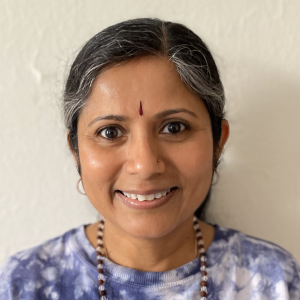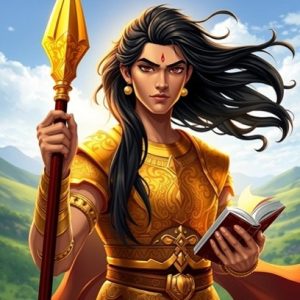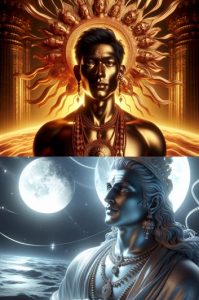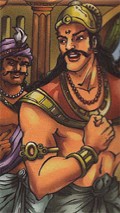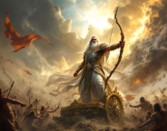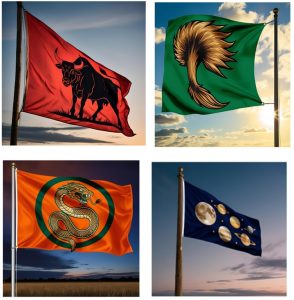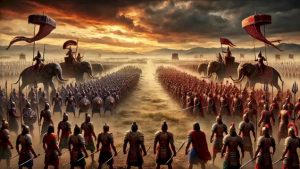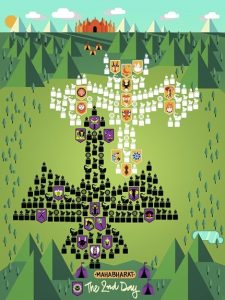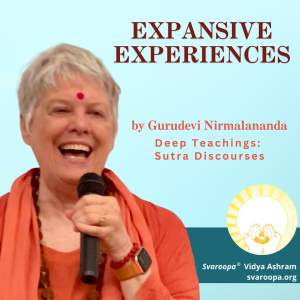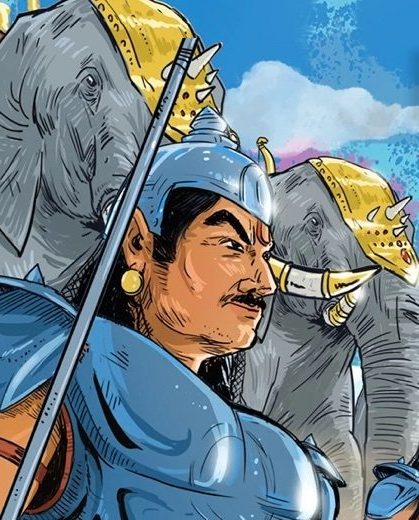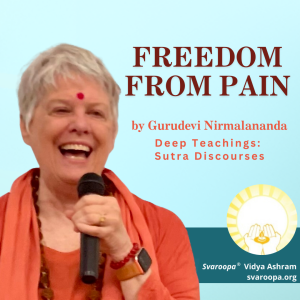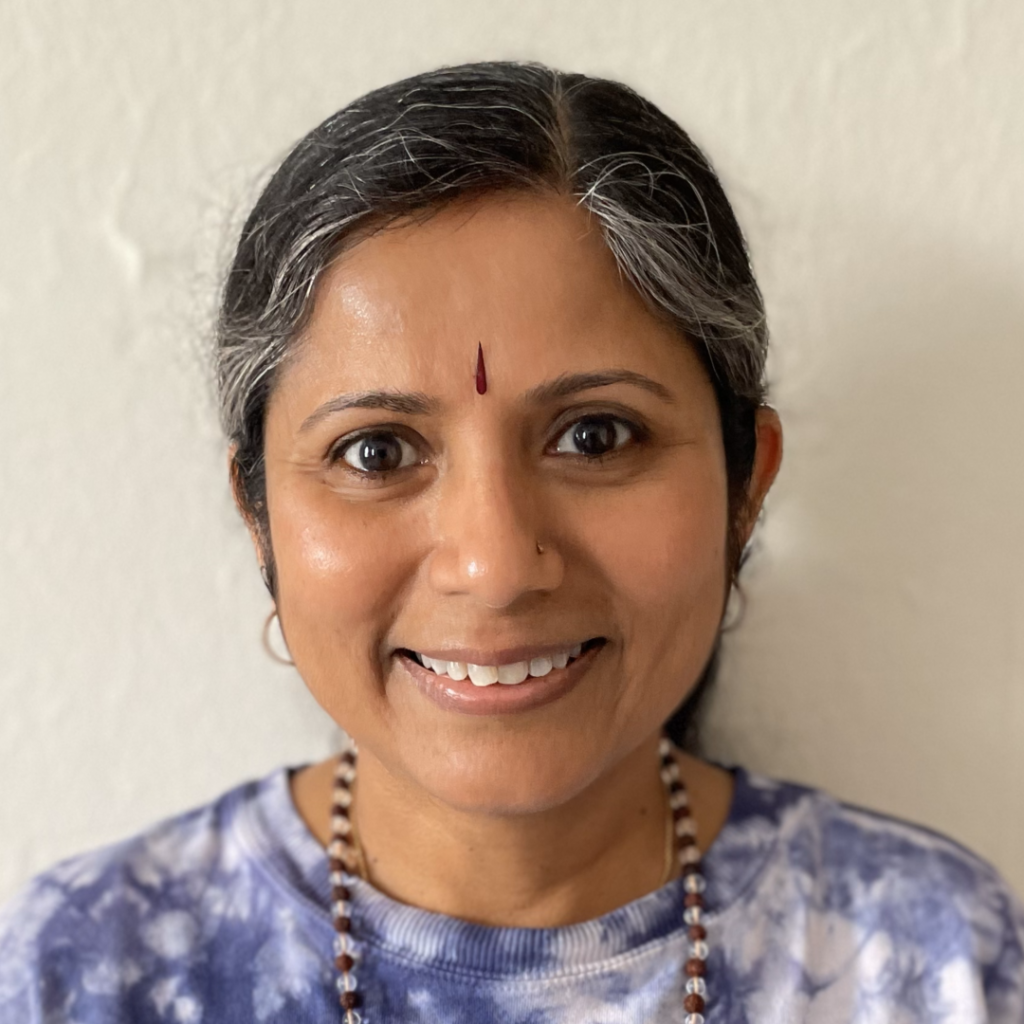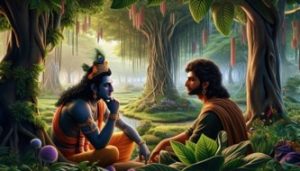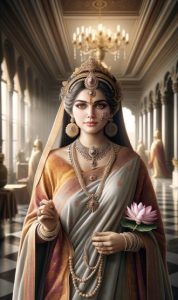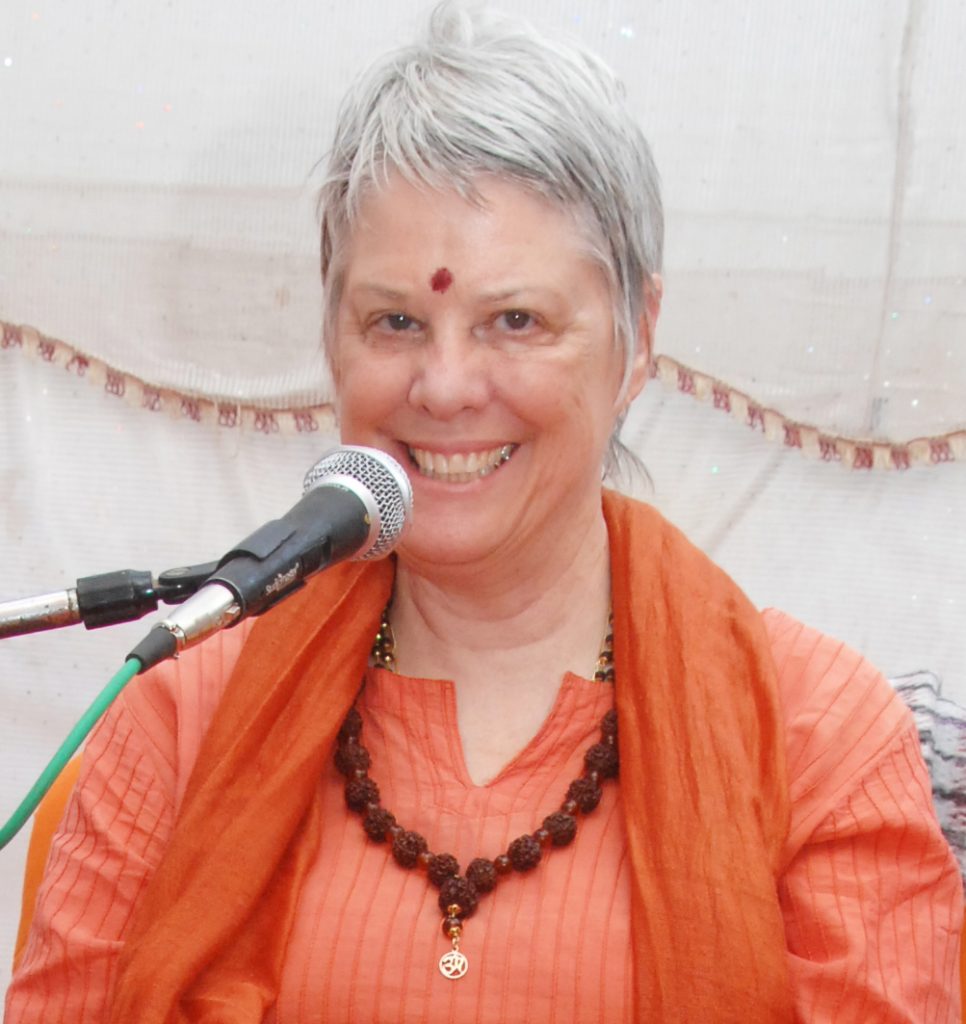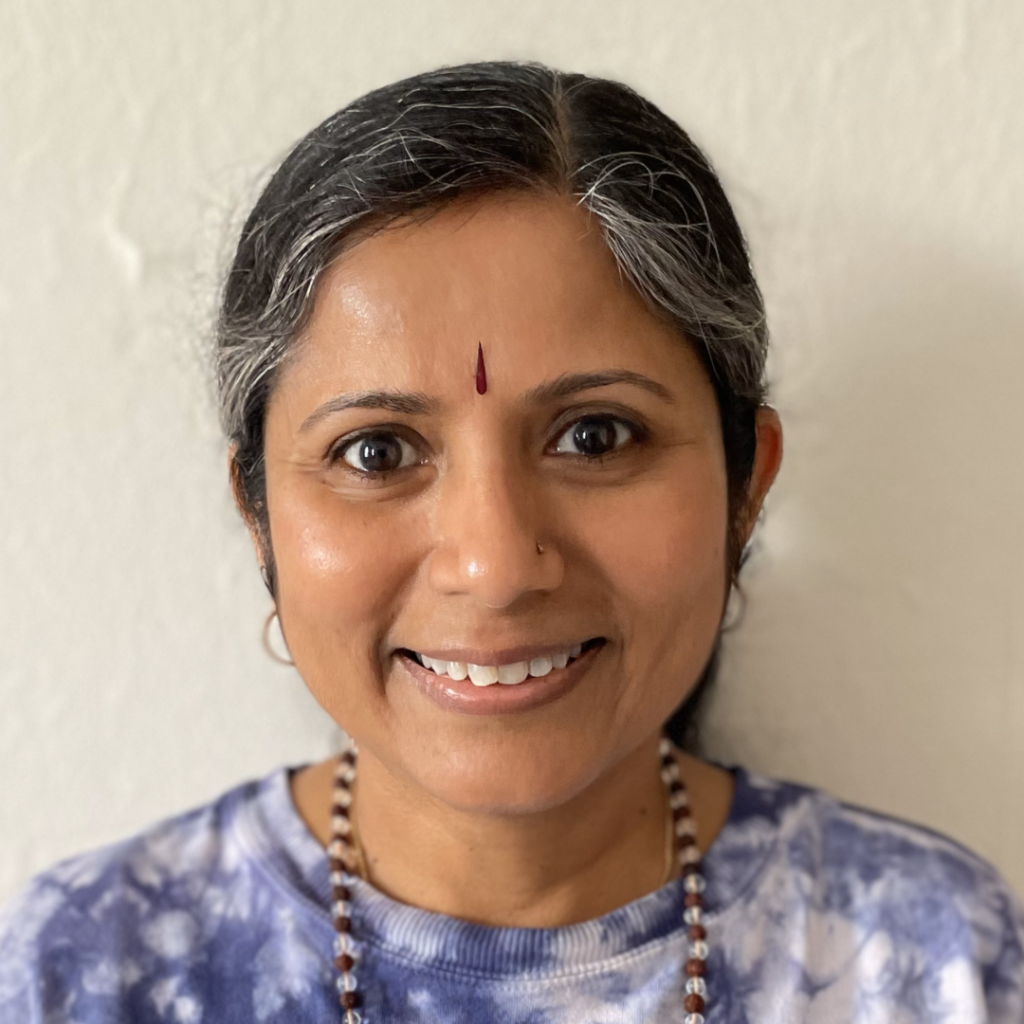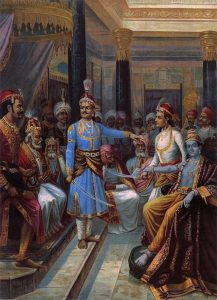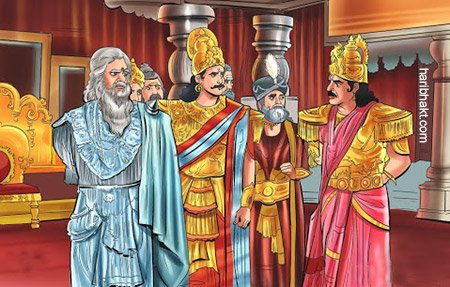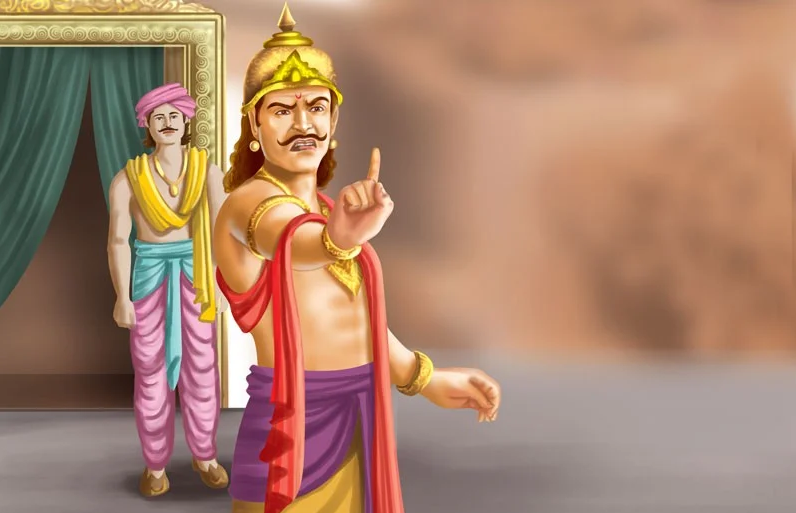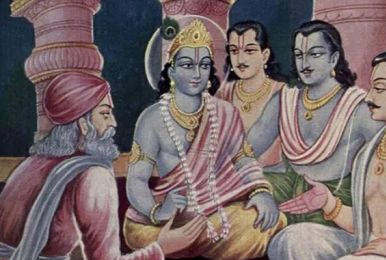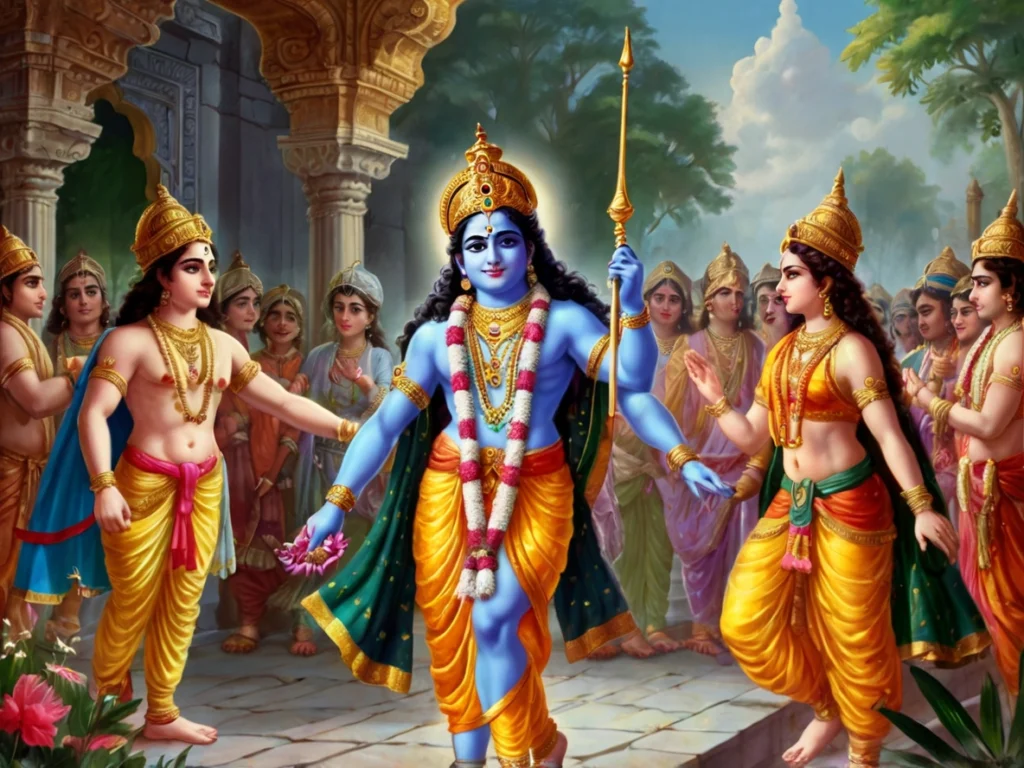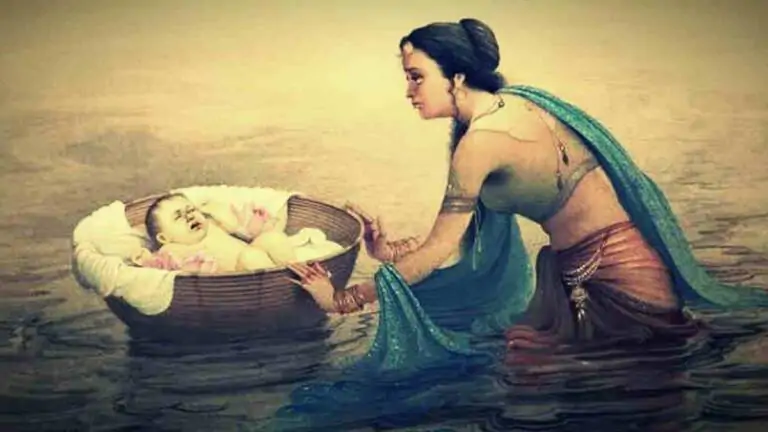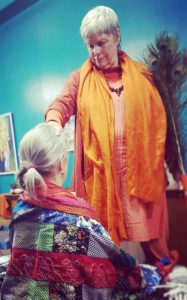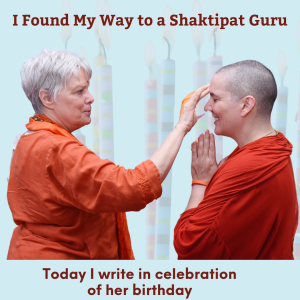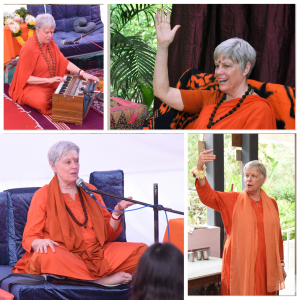By Nirooshitha Sethuram, Yogaratna
Graphics by Sheralee (Shambhavi) Hancherow
The only neutral parties in the war were: Dhritarashtra’s younger brother Vidura, the ex-prime minister of Hastinapura; Krishna’s brother Balarama; and King Rukmi, the brother of Krishna’s wife Rukmini.
When Krishna abducted Rukmini according to her will, he defeated Rukmi. Ever since that, out of shame, Rukmi never returned to his father’s kingdom. He created another capital called Bhojakata and started ruling from there.
Rukmi heard about the upcoming war and marched with his army to offer help to the Pandavas. His ulterior motive was to get closer to Krishna his brother-in-law.
Knowing Rukmi’s selfish attitude and arrogance, the Pandavas refused his help. Furious, Rukmi went across to the Kaurava camp and offered to help them. Since he went to the Pandavas first, Duryodhana also rejected his offer to help. With rejection from both parties, Rukmi returned to his capital, suffering dishonor.
Both armies pitched their camps opposite each other, leaving a vast land in between. Now they needed to find an auspicious day to do a special puja to the Goddess Kali to ensure a victory. Duryodhana went to Grandsire Bhishma seeking advice on this matter.
Bhishma advised there was no better astrologer than the Pandava prince Sahadeva, so to ask for his help in finding the best day for the ceremony. As Sahadeva is dedicated to righteousness, Bhishma believed that he would help Duryodhana with his unreasonable request.
Duryodhana silently went to the Pandava camp that night to seek Sahadeva’s help to find an auspicious day. Sahadeva welcomed Duryodhana wholeheartedly. Duryodhana, motivated by his greediness, spoke anxiously, praising Sahadeva’s expertise in astrology. Then he asked him to find him an auspicious day for Kali puja to ensure the Kaurava victory.
Sahadeva offered to help Duryodhana without reluctance, pulled out his Almanac and looked for a good day. After some calculations, Sahadeva said that the following new moon, which fell on the day after, was an auspicious time to perform the puja and to commence the war, as that would surely give Kaurava the desired victory.
Duryodhana left the Pandava camp with great joy, thanking Sahadeva profoundly. He was so certain that the war was already won. This event shows that not even Duryodhana had any doubts about the Pandavas’ innate nobleness.
First thing the next morning, Krishna and the rest of the Pandavas were told about Duryodhana’s visit with Sahadeva. Krishna pretended to be surprised and acted to show his dissatisfaction. Yudhishthira, on the other hand, embraced Sahadeva and praised him for upholding dharma even though it might cost them their lives.
Then he turned to Krishna and asked for his guidance and support.
Krishna knew that Yudhishthira would embrace Sahadeva for his righteousness. Krishna also instructed Yudhishthira to get the Brahmins to worship the sun and the moon that same day, as well as to perform rituals pertaining to the new moon instead of on the day after as per Sahadeva’s calculations. Yudhishthira and the Pandavas obeyed Krishna’s request and had the Brahmins do their rituals on that very same morning.
Seeing this, the Sun God Surya and the Moon God Chandra were very confused. They were troubled by Krishna’s actions and decided to come down to earth to ask him why he was encouraging the Brahmins to do this on the wrong day. When Krishna was confronted by Surya and Chandra, with a big smile on his face, he asked them, “When does the new moon occur?”
Surprised by Krishna’s question, they answered simultaneously, saying, “When the sun and moon come face to face together, that is the day of the new moon, as the moon cannot be seen at all. It appears invisible from earth.” With a big laugh, Krishna said, “You mean when you both come together, that is the day of the new moon, right? Here you are both together standing right in front of me. So, the new moon day is today, not tomorrow!”
The Sun God and the Moon God were confused at this straight definition. They both were taken by Krishna’s wits. That’s when they realized that he created this plan to help the Pandavas. They then departed to their respective abodes.
Duryodhana was furious to hear about this incident. He was so angry that he decided to send Shakuni’s son Uluka to the Pandava camp to mock them. Uluka was to deliver a message to Yudhishthira saying that the Kaurava army is ready to face them, under the great command of Grandsire Bhishma.
In his message, he insulted the Pandavas, calling them cowards and calling their wife Draupadi a common woman. He also insulted Krishna, calling him a sorcerer. After hearing Duryodhana’s insulting message, Uluka departed with an uncompromising message from the Pandavas and Krishna to Duryodhana. The devastating epic war, as reported in the Mahabharata, was about to start.
In Hastinapura, Sage Vyasa appeared in front of King Dhritarashtra. King Dhritarashtra was very anxious about what was going on the battlefield. Seeing this, Sage Vyasa asked if the king would like to witness the war. If so, Vyasa could grand the king divine vision.
Dhritarashtra refused the offer, saying that it would be too difficult for him to watch his own families fighting and killing each other. But he was still interested in knowing the events on the battlefield. So he said he wouldn’t mind if someone could narrate all that was happening there for him, so he could be informed. So Vyasa blessed Sanjaya, Dhritarashtra’s minister, with clairvoyance, so that he could see the battlefield right from the palace and inform King Dhritarashtra of all the happenings.
In the battlefield, Grandsire Bhishma was sitting on a silver chariot with white horses. His armor glowed like silver in the morning sun. He cheered the Kaurava army with encouraging words, saying to them to fight whole-heartedly, motivating them to walk in the path of their ancestors. He reminded them that either victory or heaven stands before them. The gate of heaven will be wide open for those soldiers who care less for their lives, so to fight with all their might and die a hero.
A true soldier never shows their back on the battlefield, fighting to their last breath. Death by a weapon is a soldier’s honor. Bhishma asked them to fight with joy, so to gain glory and honor. These words really made an impact in the Kaurava army. Encouraged by these powerful words, the Kaurava army marched with great confidence to the battlefield with shouts of victory and glory to Kauravas.
Each chariot of the warriors had their flag flying high and mighty. A flag is called a dhvaja, the symbol of a king or army that’s carried on a pole. Flags often depicted objects that represented the warrior’s skills, qualities, or affiliations.
Bhishma’s flag was a palm tree with a cluster of five stars around it, which symbolized his extensive knowledge. The symbol on Guru Drona’s flag was an altar covered with deerskin, with a kamandala (yogi’s water pot) and an archery bow on top, depicting him as a brahmin warrior.
Kripacharya had a humped bull on his flag. Ashwatthama’s had the figure of the magnificent tail of a lion. Duryodhana’s had a serpent representing strength. A golden moon with planets around it was in Yudhishthira’s flag. Bhima’s chariot bore a flag with a gigantic lion in silver. Arjuna’s flag had Hanuman, representing his basis for victory, a boon by Lord Hanuman himself. The flags flying all over battlefield announced the greatness of the warriors on it.
The following were the strengths of both the armies. Each army consisted of several divisions, called akshauhinis. Each of them had a particular number of ratha (chariots), gaja (elephants), thuraga (horses), pathathi (foot warriors and soldiers). An akshauhini or division included 21,870 chariots and chariot riders, 21,870 elephants and elephant riders, 65,610 horses and horse riders, and 109,350 foot-soldiers, in a ratio of 1:1:3:5. Therefore an akshauhini will consist of 218,700 soldiers.
The Pandavas had 7 akshauhinis while the Kauravas had 11 akshauhinis. In essence, nearly 3.94 million warriors and soldiers took part in the great Kurukshetra War. Each akshauhini was under a commander or a general, apart from the Commander in Chief, who was the head of the entire army.
During the war, the weapons included: the bow and arrows, the mace, the spear and the sword. In each of the armies, these weapons were chosen by the warriors and soldiers as their primary weapon. Mainly the bow was chosen by Arjuna, Bhishma, Drona, Karna and Abhimanyu, with the mace chosen by Bhima and Duryodhana. The spear was chosen by Yudhishthira and Shalya, and the sword by Nakula, Sahadeva, and Uluka to name a few of the warriors.
Many military formations were used throughout the 18-day battle. At various times during battle, the Commander in Chief of either army ordered special formations, called the vyuhas. Each vyuha had a specific purpose: some were defensive while others were offensive.
Each formation had its specific strengths and weaknesses. Each formation required a particular number of ratha (chariots), gaja (elephants), thuraga (horses), pathathi (foot warriors and soldiers) placed in strategic positions. The following is the list of all the vyuhas used during the battle, each with a short description.
- Krauncha Vyuha — heron or crane formation
- Makara Vyuha — crocodile formation
- Kurma Vyuha — tortoise or turtle formation
- Trishula Vyuha — trident formation
- Chakra Vyuha — wheel or discus formation in concentric circles. This is a critical vyuha that mattered during the war, with details coming later
- Kamala Vyuha or Padma Vyuha — blooming lotus formation
- Garuda Vyuha — eagle formation
- Oormi/Urmi Vyuha — ocean formation, resembling the ocean’s waves
- Mandala Vyuha — galaxy formation
- Vajra Vyuha — diamond or thunderbolt formation
- Shakata Vyuha — box or cart formation
- Asura Vyuha — demon formation
- Deva Vyuha — divine formation
- Soochi Vyuha — needle formation
- Sringataka Vyuha — horn formation
- Ardha Chandraakara or Chandrakala Vyuha — crescent/curved blade or crescent moon formation
- Mala Vyuha — garland formation
- Sarvatobhadra Vyuha – meaning “safe on all sides,” a kind of a square array formation, in which the troops face outward in all directions.
More to come…
- Krishna taking Rukmini https://in.pinterest.com/pin/853924779339300621https://in.pinterest.com/pin/853924779339300621/
- Sahadeva https://us.idyllic.app/gen/sahadeva-mahabharata-hero-511410?highlighted=1863847
- Sun God Surya & Moon God Chandra https://www.ramana-maharshi.org/ravi-another-name-for-the-sun-god-surya/ https://www.ramana-maharshi.org/chandra-the-moon-god-and-lord-of-the-night/https://www.ramana-maharshi.org/chandra-the-moon-god-and-lord-of-the-night/
- Uluka & Duryodhana https://indus-meetindus.blogspot.com/2016/04/uluka-messenger.html
- Bhisma https://dharma.werindia.com/pitamaha-bhishmas-fall-a-paradox-of-greatness/
- Battle dhvajas (flags) Images by S. Hancherow/Canva
- Krauncha vyuha (Crane formation) http://www.artofkarthik.com/stories/2017/8/29/mahabharata-war-2nd-day
- Akshauhinis (divisions) of armies https://www.gathertales.com/en/story/the-legend-of-the-battle-of-kurukshetra/sid-404
